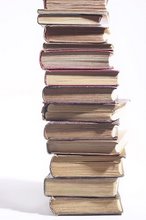I'd suggest A. "No," the student would say, "I don't know anything about A."
How about B? "No, I hate B."
C? "I've written about C a million times. I'm bored with C."
After about 15 minutes of offering suggestions that the student dismissed, I'd give up. The lack of a subject for writing then became my problem, because I wasn't creative enough to think of a perfect, interesting, inspiring subject for the kid.
And so it is with bookselling. Only worse. Instead of a single topic in expository writing, I'm faced with millions of books--and the loonies.
Earlier this week a customer came in and bought a book. Before she left, she told the staffer that she wanted to talk with the owner.
"Hi, I'm P-doobie, the owner," I said. "How may I help you?"
"Do you read U. S. News and World Report?" she asked. I told her I didn't. "Well, you should," she replied. I asked her why. "I'm not going to tell you, because you should already know. You should just buy a copy and find out." I thanked her warmly for the tip and started to go back to the office. She said, "You should read it because it has those lists of books."
I turned back. "A best-seller list?"
"Yes. You should have a best-seller list." She was standing in front of the best-seller shelves.
I said, "We do have a best-seller list, and it's published every Thursday in the Monitor. And here," I said gesturing to the books, "are the best-sellers in independent bookstores throughout the country."
She said, "I know that. I don't like those books [gesturing at the shelves], and there's nothing on the Monitor list that I want to read. Too sciencey."
"We also publish a monthly best-seller list in our email newsletter. Would you like to subscribe?" I asked.
"No," she said. "I hate email, and I don't want your list. I want a list like the one in U. S. News and World Report."
"What makes it different and special to you?" I asked.
"I'm not going to tell you. You should just buy a copy and find out for yourself."
I thanked her again and turned to head back to the office.
"It has a list of books and one line about each one."
I returned to the counter and said, "When someone on our staff reads a book they like, they write a note about it and put the note in the book. See?" I showed her many of the best-sellers and all the staff-picks section with shelf-talkers.
"I don't want to read those," she said. "They're too long. I don't want to read a lot."

"'Looks like war, Miss Scarlett.' 'Fiddle-dee-dee!' 'BOOM!' Now this is Gone with the Wind as it should have been written!"

5 comments:
Theoretical Evolutions in
Person-Centered/Experiential
Therapy: APPLICATIONS TO SCHIZOPHRENIC
AND RETARDED PSYCHOSES by Garry Prouty -- A comprehensive overview of the typical bookstore customer. An invaluable resource to independent booksellers in the Southwestern United States and elsewhere.
At least she dispensed her advice free of charge,I trust?
Since she likes things in list form maybe she'd like "The Book of Lists." It has lists of simple data, lists of factoids, and, when she's in the mood for some heavy reading, lists of little, one or two paragraph, essays.
What I don't understand about best seller lists is why does it matter whether the list in in the New York Times or U. S. News and World Report? How can a best seller show up on one list and not the other? I could understand how the list of Best Sellers for People who Think Just Like the Editors of U. S. News and World Report could be different from the others but that's typically not the list.
Chuckbert, the New York Times best-seller list is a list of books shipped from the publishers to wholesalers and retailers, not necessarily bought in bookstores. Sam's Clubs throughout the country, for example, could order pallet loads of James Patterson's book of the week and help shoot it to the top of the NYT list. The list tends to be rather static compared with lists from independent booksellers; it drives a lot of sales.
The American Booksellers Association, whose list we use for our best-seller shelf, publishes a list of best-sellers that are actually bought in independent bookstores.
The Mountains and Plains Independent Booksellers Association publishes a weekly list of regional best-sellers.
Of course, whether anyone is actually reading the books they buy is another story . . . .
Whoa! Who would of thought this generate a whole new list?!?
Word verif: nonsub, kinda like unsub...which would be the character in most of the books I like to read.
Post a Comment